Lingua Sinica Newsletter, 2 May
News, analysis, and commentary on Chinese-language media from the PRC and beyond.
Welcome back to Lingua Sinica.
For most of the world (sorry, North America), May 1 is a day to celebrate the workers of the world — namely, by not doing any work. And for readers of China’s CCP-led media, one of its greatest blessings is shorter editions of the flagship People’s Daily. Generally, the newspaper, which conveys the key tone and policies of the leadership, runs to 20 full pages. Yesterday and today, however, it was just eight pages – including full-page ads for Wuliangye (五粮液), a pungent liquor made in Sichuan from sorghum, rice, wheat, and corn.
But the most potent concoction in the People’s Daily so far this week is the official rhetoric anticipating Xi Jinping’s visit next week in Paris with French President Emmanuel Macron (who has invited EU Commission Chief Ursula von der Leyen to join) — his first overseas trip this year.
Tuesday’s edition led with a zesty front-page toast to Sino-European cooperation as essential to providing the world with greater stability. “With a confluence of turmoil in international events, the world needs China and Europe to work together as partners in maintaining and practicing true multilateralism in meeting global challenges,” it said.
From our partner project, Decoding China, a cautionary note on what China means by multilateralism. Yesterday’s edition included an unpalatable commentary on the “Sino-French spirit” from China’s much-despised ambassador in Paris, Lu Shaye (卢沙野), whose wolf warrior ways have been an illustration of “true multilateralism” in action — and who, according to our sources in France, was persona non grata in diplomatic circles for many months, “still in Paris but with no contacts with French officials.”
Whether or not you subject yourself to state media, we hope you had a happy Labor Day holiday yesterday — and beyond, for those lucky enough to get a “Golden Week” off. I took the day to go visit Chiang Kai-shek’s mausoleum and the eerie garden of his unwanted statues that adjoins it… find our story on the non-story surrounding these (with a selection of photographs) below.
Ryan Ho Kilpatrick
CMP Managing Editor
IN THE NEWS
Keeping His Feet Dry
As deadly floods displaced over 100,000 people in coastal Guangdong, President Xi Jinping hurried south — but not that far south. Instead of leading life-saving efforts in the flood-stricken province, Xi embarked on yet another inspection tour of inland metropolis Chongqing.
It fits his MO well. Whereas former leaders Hu Jintao and Jiang Zemin would head to disaster-stricken regions and be shown by the media providing in-person support, Xi has generally preferred to keep a safe distance. During severe floods that devastated Henan in 2021, he was not seen in public at all, and then went on an inspection tour to Tibet. It was his deputy, Premier Li Keqiang, who traveled to inspect the damage a month later. When floods struck the year before that, a rare trip by Xi to the flood zone in Anhui, where he kept his feet notably dry, contrasted sharply with a trip by Premier Li to Chongqing, where he was shown trudging through the muck like a true man of the people. Images of Li were actively sidelined in an effort to keep Xi center-stage.
Xi’s strategy of keeping aloof and issuing “important instructions” (重要指示) means he can be credited with local authorities’ successes — and decry their failures. In Henan’s case, these vague commands were trumpeted by Party media and led the official Xinhua News Agency’s readout about rescue and relief efforts, giving the impression Xi was leading from the front.
This time as usual these instructions were neither timely nor helpful. Last year Xi and his new Premier Li Qiang urged on flood relief efforts and emergency responders in neighboring Hebei nearly a month after the province was inundated, with emergency responses already well underway. Xi only visited the area once reconstruction by local cadres was complete.
These tactics are likely Xi’s way of keeping himself in the limelight as a force urging on local cadres while at the same time keeping his distance and avoiding responsibility for criticisms levied against authorities in the affected regions. And then again, maybe he just wants to keep his feet dry.
(OVER)REACTIONS
Still Standing
On April 23, Hong Kong’s South China Morning Post broke what sounded like bombshell news: Taiwan had “pledged” to “tear down” every statue of leader Chiang Kai-shek around the nation — something the SCMP framed as a new development that risked antagonizing Beijing.The question of what to do with the former dictator’s likenesses has been raging for years. Supporters of the ruling Democratic Progressive Party tend to see them as glorifying a past oppressor, while the opposition Kuomintang (KMT), which Chiang once led, argue that removing the statues is akin to erasing history and Taiwan’s links to the Chinese mainland. Any move to resolve this debate once and for all would have been huge news across the country.
So why, then, did no Taiwanese media pick up the story?
Simply put, because there was no story.

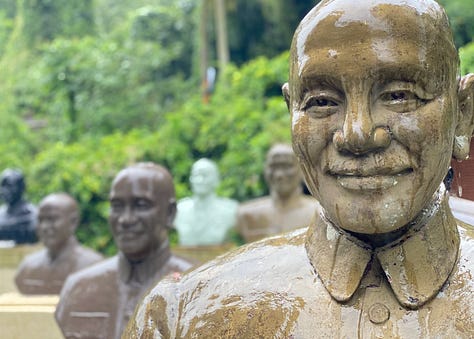
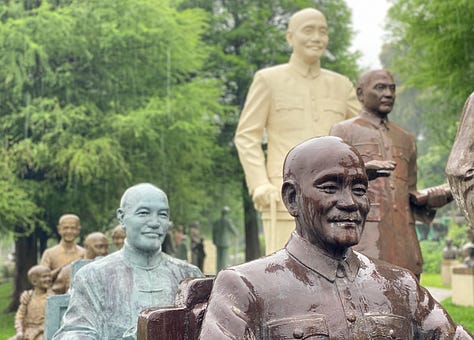
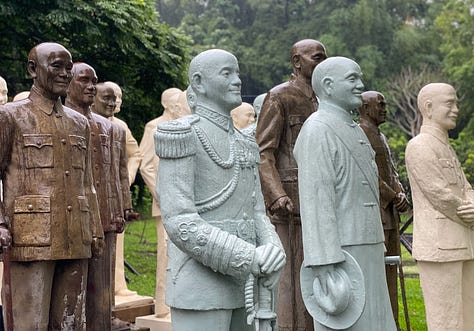

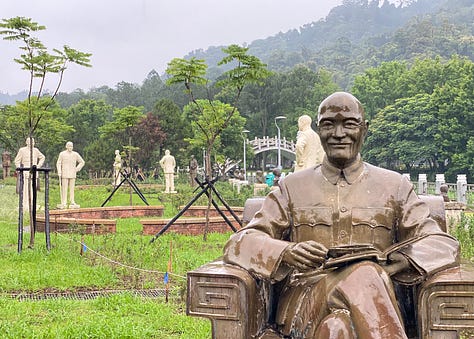
As Brian Hioe pointed out in New Bloom magazine, Taiwan was not beginning a new purge. In 2022 the government said it would provide subsidies of 100,000 NTD for the removal of unwanted Chiang statues. On April 22, a question had merely been raised by one of Taiwan’s legislators about why statues of Chiang already slated for removal were still standing despite these subsidies. The department responsible said the Ministry of Defense wanted to keep their statues, and they would keep liaising with the MOD on the issue. These questions “were not a sign of an impending push by the DPP to rid Taiwan of Chiang Kai-shek statues,” wrote Hioe. In its own reporting on the story, The Guardian issued a clarification telling readers the same.
Some 760 statues of Chiang remain scattered throughout Taiwan — an impressive number, if you don’t compare it to the more than 40,000 the “Generalissimo” left in his wake. Many of these can be found today in the garden surrounding Chiang’s mausoleum. Set in a rain soaked nook of the northern Taiwanese countryside said to resemble Chiang’s hometown in Zhejiang, they stand before his final resting place like an eerie terracotta army of his own doppelgangers.
The removal of the mammoth Chiang Kai-shek memorial in Taipei is a hot-button issue in the capital, where the current KMT mayor, Chiang Wan-an, claims to be his great-grandson.
SOURCE CODE
Foreign Praise, the Red Standard
There have been growing signs in China’s official media discourse since March this year that the country’s leaders are more confident about the direction of the economy than they have been in previous months when cautious terms like “seeking progress in stability” (稳中求进) have warned against exuberance. It is the nature of CCP propaganda, however — betraying a deep-seated sense of insecurity — to treat the confidence voiced by foreign experts and “old friends” as the highest praise.
In keeping with this decades-old rule, the CCP’s flagship People’s Daily newspaper signaled economic confidence last week with a report laying out a long list of positive remarks from foreign commentators. The headline: “We Are Brimming With Confidence For China’s Economic Prospects” (“我们对中国经济前景充满信心”).
Who were these cheerful economic cheerleaders for China?
Flattery Foreseen
Our dive into the list of eight sources (including two each from Brazil and Saudi Arabia, and the rest from Cuba, Thailand, the United States, and Lebanon) quickly confirmed our suspicion that these were state media regulars, called on dependably for pro-China quotes but rarely ever seen outside Party-state sources.
Leading the list was Denis Simon (丹尼斯·西蒙), the former University of North Carolina professor who told China’s government-run China Daily last year that he had resigned due to “an unbridgeable philosophical gap between the university's academic leadership and myself regarding engagement with China.” Simon is identified in the People’s Daily by his current role as a distinguished fellow at the Institute for China-American Studies (ICAS), a DC-based think tank founded by China in 2016 under Hainan's National Institute for South China Sea Studies (NISCSS). Search Simon in English or in Chinese and you are treated to a slew of state media citations.
Next up in our search was Wichai Kinchong Choi (蔡伟才), a senior vice president at Thailand's Kasikorn Bank who describes himself as "a Chinese market expert with extensive marketing and banking experience in the region." Choi too is a regular in state media and government-linked sources, including the State Council Information Office, China Daily, Xinhua, and China Radio International (CRI) — but appears virtually nowhere else. A report from Xinhua last year quoted the banker as saying simply, without further elaboration, that "China's economic growth is precious."
SPOTLIGHT
Between Life and Death
Last week, Taiwan’s constitutional court debated the constitutionality of the death penalty. The case was brought up by all 37 of the country’s death row inmates.
The persistence of capital punishment in Taiwan undercuts its image as a bastion of liberal, progressive values in the region. While it may be a legacy of darker times, however, it remains widely popular with the public — in fact, it has only become more popular since Taiwan’s democratization.
The ruling Democratic Progressive Party has a reputation for skirting around the issue, likely afraid to isolate the overwhelming majority of voters with their more progressive views on the subject. Under DPP governments, capital punishment has been used sparingly, reserved only for those who have been convicted of the nation’s most grizzly and outrageous killings. That only seems to have made it more popular as the public glimpses the issue through the headlines in Taiwan’s often highly sensational media.
But what is life like for Taiwan’s death-row inmates during those years or even decades when they are caught in between life and death, unsure which day will be their last? This is a question explored in a recent story by the independent news site The Reporter that highlights the fearless academic work of Ciwang Teyra, an associate professor of social work at National Taiwan University.
Teyra leads the Death Row and Life Inmates Interview Project, which has interviewed all 37 convicts currently awaiting execution in Taiwan’s prisons in order to document their lives and experiences. The project’s final report is not due for release until September this year, two months after the constitutional ruling is expected in July. But the story at The Reporter, “Daywalking on the Boundary Between Life and Death” (日行在生死邊界), shares some of the researchers’ more revealing findings. For example, 65 percent of the inmates have less than a junior high education, 17 have been waiting over 20 years to be executed and two have been waiting more than three decades.
In a polarizing and emotive debate that gets to the heart of what Taiwan is and what it should stand for, reporting like this is critically important for informing that discussion.
TRACKING CONTROL
Broken Links
Over the weekend, China’s top internet control body moved to shut down external hyperlinks leading to unblocked content — a simple form of information loophole increasingly exploited by Chinese social media users and websites to get around censorship.
The Cyberspace Administration of China (CAC) said Sunday that it had launched a nationwide campaign to ban and root out illegal external links on social networks and online platforms leading to “illegal web addresses” (非法网址) or to “information from illegal web addresses” (非法网址的信息). The campaign, which runs to the end of June, restricts the use of external links — including to overseas websites — in the comment sections of online platforms, as well as in usernames, profile pictures, or account pages.
As is typically the case for such broad crackdowns, the CAC attributed the action to “complaints expressed fiercely by the masses” (人民群众反映强烈), suggesting it had broad public legitimacy.
NEWSPEAK
Tearing Down “High-Level” Chinese
“Where are you from?” a militiaman asks a terrified journalist in the new box office hit Civil War.
“I’m from — I’m from Hong Kong,” he sputters.
“Oh, China,” the gunman says, before shooting him dead.
Civil War may not have received a coveted theatrical release in mainland China, but this ten-second clip from the film has gone viral on the Chinese internet. Nationalistic accounts sharing the video have been doing so alongside the hashtag “Gaohua” (高華) — a contraction of the derogatory term “high-level ethnic Chinese” (高級華裔).
This phrase is often levied against overseas Chinese, Taiwanese, and Hongkongers who dare, according to their PRC detractors, to forge a sense of identity beyond (or “above”) their Han ethnicity, and therefore fail in their loyalty to the nation. Relatively obscure before the clip went viral, the phrase has seen a sharp spike in usage on Weibo over the past week.
In the film itself, the point of this scene is not that the ultranationalist militia that executes the Hong Kong journalist (played by a Taiwanese Canadian actor) is right, or has any sharp insight into the meaning of Chineseness — quite the opposite. Yet it is being used in an uncritical, decontextualized way to cut down uppity Chinese with ideas that are, or so it is implied, above their station.
The phenomenon of its virality, too, is layered: on the surface, there’s something ironic about using the gaze of white racists to justify Han ethnic unity; but underlying that, what could be more fitting than one form of hateful ethnonationalism — even from a fictional setting — inspiring another?
Look out for more on this term from CMP and Lingua Sinica in the future.
REDLINES
Pulling Out the Nails
News and revelations of spying have been a hallmark of China’s relations with foreign countries in recent weeks — with alleged Chinese spies making the headlines in Germany, Belgium, France and the UK, and authorities in Beijing ramping up rhetoric about secret operatives and informants lurking in Chinese society.
On April 23, the American Chamber of Commerce in China released a report expressing concern over a series of national security-related campaigns this year it said have created an unsafe climate for foreign businesses by pushing the idea that foreigners are a security risk — despite China’s insistence that its doors are open for outside investment.
The report cited a three-minute video released by China’s Ministry of State Security (国家安全部) as part of a broader propaganda campaign around the annual National Security Education Day on April 15 to educate and alert the Chinese public about the growing threat of foreign spies. The campaign included a widespread push across state media and social media to encourage Chinese, particularly youth, to follow a WeChat public account launched by the MSS in July last year.
On Monday this week, China’s current minister of state security, Chen Yixin (陈一新), followed on Xi Jinping’s April 15 speech on national security by urging society-wide implementation of what the CCP has called “a comprehensive view of national security” (总体国家安全观). In remarks that played across state media, linking counterespionage to elements within Chinese society, he called on the country to oppose “interference by foreign forces” (外部势力), and said that strong implementation of China’s counterespionage law, which took effect one year ago, would be necessary to “pull out the ‘nails,’ and eliminate traitors.”
REDLINES
Becoming “Comrades”
Last week, we published an interview with acclaimed Taiwanese novelist Chi Ta-wei (紀大偉) on the Lingua Sinica Substack. Chi takes us on a fascinating journey through the history of queer or “tongzhi” (同志) literature in Taiwan — something that, he compelling argues, is unique in the world.
Following up on this discussion, we asked Chi how “tongzhi,” the word for “comrade” widely used in the PRC, came to represent queer people in Taiwan and throughout the Chinese-speaking world. If you assumed the term was reappropriated in China and spread out from there, you’ve got it the wrong way around. We’ll let Chi explain:
According to my own research, as early as the 1970s, the Singaporean writer Maike (a transliteration of "Michael") already jokingly appropriated "tongzhi" to refer to homosexuals. At that time, the actual comrades locked inside China proper were busy with the Cultural Revolution and didn’t know about the appropriation of "tongzhi" among Singaporean gay men.
Many attribute this playful reinterpretation of "tongzhi" to Edward Lam, a gay writer in Hong Kong in the late 1980s, but it is obvious that Lam was inspired by Maike, who was also active in Hong Kong in the 1980s. While it is true that Taiwanese people, including myself, learned to use "tongzhi” from Lam in the 1990s, this is because he often visited the cultural circle in Taipei while Maike did not. This usage of “tongzhi” was not popularized in China proper until it had already replaced "homosexual" in Taiwan in the 1990s. Hong Kong was known for its circulation of international and local queer cinema and had a more glamorous gay scene at the time, but “tongzhi literature” is a creole invention of Taiwan — with Hong Kong’s influence.
It is often wrongly presumed that Chinese political centers like Beijing and Shanghai influence people of Chinese ancestry abroad, but history proves the opposite. It is fairest to say that “tongzhi” as a reinvented term was first used by Singaporeans, then Hongkongers, then Taiwanese, and finally by people in China proper.
Read our full interview with Chi Ta-wei here for more insights.
GOING GLOBAL
The Local Push for Global Propaganda Strengthens
Over the weekend, Jiangxi followed a host of other Chinese provinces in launching an international communication center, or ICC, an office under the local propaganda department and the local CCP-run flagship newspaper group intended to strengthen external propaganda work. Introducing what it called its “overseas communication array” – the web of outlets meant to push its messaging — the new ICC focused on “Meet Jiangxi,” a brand that already, somehow, has more than 100,000 combined followers of its accounts on Instagram, X, and YouTube.
Since 2022, a series of ICCs (国际传播中心) have been established across multiple provinces and jurisdictions in China, responding to a directive issued by President Xi Jinping in August 2018 that urged the use of media groups at the provincial and city levels to further national external propaganda goals. Since the beginning of this year, at least five new ICCs have been launched, including Hebei’s Great Wall ICC, Heilongjiang’s Northeast Asia ICC, and Sichuan’s city-level Ya’an ICC.
As it unveiled the new ICC and partnerships with key state media groups, including China Daily, Xinhua News Agency and China News Service, Jiangxi province announced that it had engaged Ailian (Irene) Zhu (朱爱莲) as an “overseas promotion ambassador” (海外推介大使). A native of Jiangxi, Zhu is the founder of EurAsia Forum, an international non-profit organization based in Zurich, Switzerland, that says its mission is to “[help bring] Europe and Asia (in particular China) closer together, as an important facilitator of sustainable economic and cultural relationships.” Prior to 2019, the organization was known as the Connecting China Media Association (CCMA).
Irene Zhu is also the founder and publisher of EurAsia Info (欧亚时报), a Chinese-language newspaper launched in Switzerland in 2012. In a 2019 interview with China News Service (CNS), a newswire under the United Front Work Department of the CCP, Zhu echoed the external propaganda policy of Xi Jinping as she explained the role of her paper. “As a communication messenger between China and Europe,” she said, “delivering good stories and content from China to the local mainstream society is what we want to do most."
CMP IN THE HEADLINES
Falling Stars
In early April, the Star Media Group (SMG), one of Malaysia’s largest integrated media conglomerates, announced a collaboration deal with China’s Contemporary World magazine, an outlet directly under the Central Committee of the Chinese Communist Party. Following on a report from the China Media Project making the associations of Contemporary World clear, a Chinese-language report at Voice of America (VOA) further explored the reasons behind the decision at SMG.
The VOA quoted Eng King Sia (黄金城), the former deputy editor-in-chief of Malaysia’s Oriental Daily News (东方日报) as saying that the recent move by SMG was related to business declines in recent years, and the desire of its largest shareholder, the Malaysian Chinese Association (马来西亚华人公会), to strengthen exchanges with the Chinese Communist Party. Eng said that SMG had historically been able to maintain its editorial independence in China-related coverage, but the partnership could make the group more cautious in dealing with sensitive political issues with regards to China.







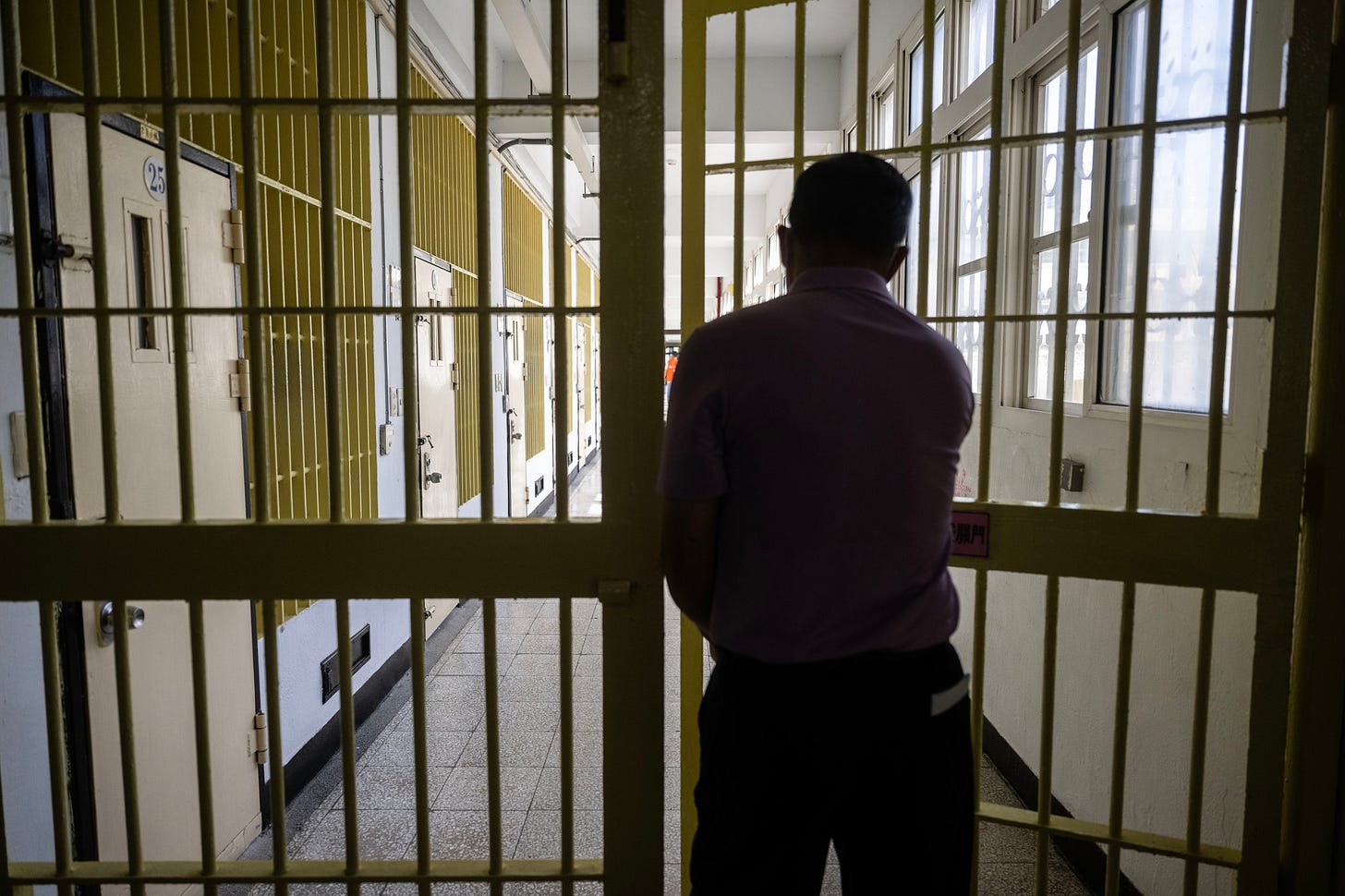
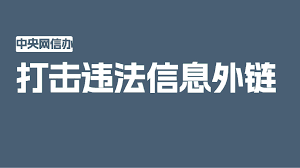




Thanks for explaining the roots of the word 同志 👍🔥 and all the other interesting stuff!